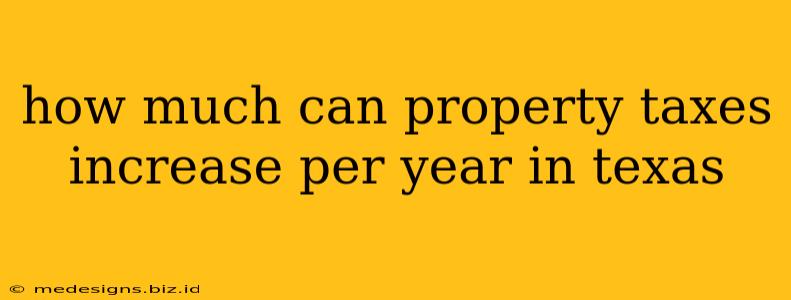Texas homeowners often wonder: how much can my property taxes increase each year? The answer isn't a simple number, as it depends on several factors. Understanding these factors is crucial for budgeting and planning your finances. Let's break down the complexities of Texas property tax increases.
Understanding Texas Property Tax Increases
Unlike some states with strict limits on annual property tax increases, Texas operates under a different system. There's no statewide cap on how much your property taxes can rise each year. Instead, the increase is primarily determined by the appraisal value of your property and the tax rates set by local taxing entities.
1. Appraisal Value Increases
The appraisal district in your county is responsible for evaluating your property's market value each year. If your property's value increases, so will your property taxes, even if the tax rate remains the same. These appraisals are based on comparable sales in your area and can fluctuate based on market conditions. Factors influencing appraisal increases include:
- Market demand: A hot real estate market often leads to higher appraisals.
- Property improvements: Additions, renovations, or upgrades increase your property's assessed value.
- Neighborhood improvements: New schools, infrastructure improvements, or general neighborhood upgrades can raise property values.
Important Note: You have the right to protest your property appraisal if you believe it's inaccurate. The appraisal district provides a process for challenging the valuation.
2. Tax Rate Increases
While appraisal increases directly impact your tax bill, changes in the tax rate set by local government entities also play a significant role. These entities include:
- Counties
- Cities
- School districts
- Special districts (e.g., water, hospital)
Each entity sets its own tax rate, and these rates can increase or decrease depending on their budgetary needs. A higher tax rate means higher property taxes, even if your property's appraisal value stays the same.
Transparency is key: Taxing entities are required to publicly announce proposed tax rate changes and hold public hearings before finalizing them. Stay informed about these announcements to understand potential tax increases in your area.
3. The Wildcard: Property Value Growth
The combination of appraisal increases and potential tax rate hikes can lead to significant property tax increases in some years. In rapidly growing areas of Texas, it's not uncommon to see substantial increases, sometimes exceeding 10% or more annually. Conversely, in areas with slower growth or declining markets, the increases might be minimal or even nonexistent.
How to Minimize Tax Increases
While you can't control market forces, there are steps you can take to potentially minimize your property tax burden:
- Protest your appraisal: If you believe your property's appraisal is too high, file a protest.
- Monitor tax rates: Stay informed about proposed tax rate increases by your local taxing entities. Attend public hearings and voice your concerns.
- Explore tax exemptions: Certain homeowners, such as seniors or disabled individuals, may qualify for tax exemptions that reduce their property tax liability.
- Consider long-term strategies: For long-term planning, consider strategies like refinancing your mortgage at a lower rate to reduce your overall housing costs.
In Conclusion
There's no single answer to how much Texas property taxes can increase per year. The potential increase is highly dependent on the interplay of property value appraisals and the tax rates set by local government. Staying informed, understanding the process, and proactively engaging with your local government are crucial steps to managing your property taxes effectively in the Lone Star State.
